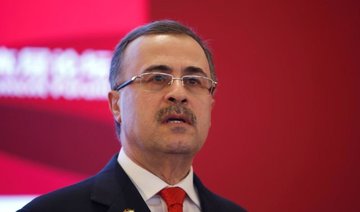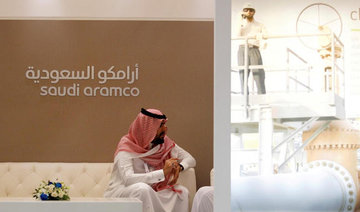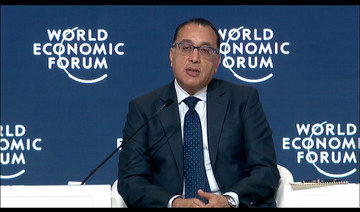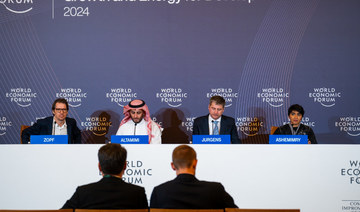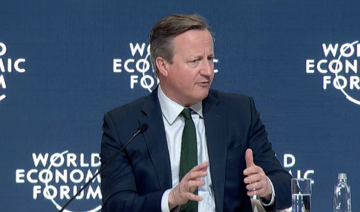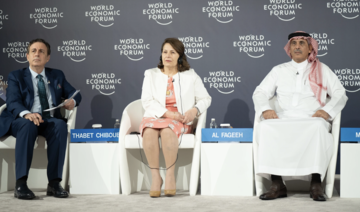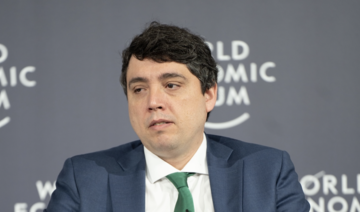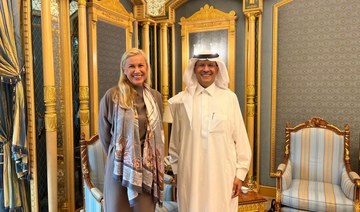HOUSTON: Amin Nasser, chief executive of Saudi Aramco, said the oil and gas industry must “push back” against suggestions that oil demand is in long term decline and that Saudi energy assets will be left “stranded” in the ground as alternative energy sources are developed.
In a keynote address at the CERAWeek by IHS Market gathering of top energy experts in Houston, Texas, Nasser also warned that the oil market faces “multiple downside political risks,” and needs $20 trillion of investment over the next 25 years — the size of the American economy.
He was speaking on the 80th anniversary of the discovery of oil in Saudi Arabia, when American geologists found significant reserves of crude in Dhahran, which led to the creation of Saudi Aramco.
“Today I want to be clear about what really lies ahead for our industry, and the actions we must take to secure that future,” he said.
“We must leave people in no doubt that misplaced notions of ‘peak oil demandʼ and ‘stranded resourcesʼ are direct threats to an orderly energy transition and energy security,” he said, adding: “Oil and gas will continue to play a major role in a world where all energy sources will be required for the foreseeable future.”
On the current oil market, he said market fundamentals were healthy. “Despite recent volatility in the financial markets, the broad-based recovery in the global economy remains on track. It is particularly encouraging to see expectations of stronger economic growth in the emerging and developing world because that is where most oil demand growth is expected to be. Oil demand globally also remains healthy,” he said.
Nasser pointed to flaws in all the various alternatives that have been advocated as future energy sources.
“The hot topic in energy transition is the future role of oil in transport. At the heart of it is the light duty road passenger vehicles segment (cars) that accounts for about 20 percent of global oil demand today. Many wrongly believe that it is a simple matter of electric vehicles quickly and smoothly replacing the internal combustion engine,” he said.
The future for alternatives to the motor car and internal combustion engine was “far more complex,” he said.
“In fact, there are five strong technology horses racing each other to become the powertrain of the future — advanced internal combustion engines; hybrid electric vehicles; plug-in hybrid vehicles; pure battery electric vehicles; and hydrogen fuel cell vehicles. The first three are powered by an internal combustion engine. And let us not forget that more than 99 percent of the passenger vehicles on the road today have an internal combustion engine and will be with us for a long time,” he pointed out.
The transformation of the motor industry was still unclear, Nasser said. “In fact, some of the most disruptive technologies are only just emerging, including highly advanced integrated engine-fuel systems like the ones our researchers are working hard on at Saudi Aramco in collaboration with car and truck engine manufacturers.
“So, given the world’s focus on climate change, there should be a global priority on improving the efficiency and lowering carbon emissions from internal combustion engines as well as fuels, especially when the other two horses in the race — pure battery electric vehicles and hydrogen fuel cell vehicles — still face a range of problems,” he added.
There were other factors that further complicated the search for oil alternatives. “There are also major hurdles before alternatives can be deployed at scale. Affordability is one, as customers continue to place great importance on up-front costs, especially in developing nations. Another is that it will become increasingly difficult for governments to subsidize such enormous numbers, although this is often glossed over,” Nasser said.
“It will require massive infrastructure, which is particularly challenging in developing nations as they are least well-equipped and can least afford this in the face of other economic and social priorities. Yet the majority of vehicle growth will be in those very same nations.”
Analysts estimate that traditional motor car usage accounts for 20 percent of global oil demand, but that figure is complicated by future demographic trends.
“Further adding to the complexity will be the extra two billion people on the planet by 2050, a world economy three times its current size., and a global middle class that will reach five billion by 2030 – with two-thirds of it in Asia driving consumption. These macro factors will only grow demand for road passenger transport,” Nasser said.
“So, yes, battery electric vehicles will grow and have a welcome role to play in global mobility. But given the competition and complexity of the transition, their impact on the 20 percent oil demand should not be exaggerated,” he added.
The rest of the demand side presented great opportunities for oil producers, he said. “In petrochemicals alone, oil use is expected to increase by almost 50 percent, while the number of air passengers each year is expected to almost double to 8 billion over the coming two decades.”
There were also new outlets being developed for Aramco products, he insisted. “For example, Saudi Aramco recently signed an agreement centered on a potential breakthrough technology that will directly convert up to 70 percent of a barrel of crude into petrochemicals.
“This could transform the role of oil as a major petrochemical feedstock, substantially lighten the carbon footprint of oil consumption because of its non-combustible nature, and reduce costs by 30 percent, and become a large and reliable outlet for our future oil production,” he said.
“I also see huge potential in producing advanced materials for use in a wide range of high growth industries. Just imagine a future where skyscrapers, cars (including electric ones!), and even our own pipelines are built with these advanced oil-based materials.
“Looking further ahead, if we combine hydrogen from oil with carbon capture, utilization, and storage then green hydrogen comes within reach – not only for transport but also power and heat,” he added.
Oil and gas will continue to play a major role in a world where all energy sources will be required for the foreseeable future.
But he insisted that the energy industry needed action in four main areas to enable it to face the future:
“First, we need to expand exploration. Last year, only 7 billion barrels equivalent of oil and gas combined were discovered, which is among the lowest on record.
“Second, we must not only meet the growth in oil demand but also offset a large natural decline in developed oil fields. Even conservative estimates suggest about 20 million barrels per day of new capacity is required over the next five years,” Nasser said
“Third, our industry needs more than 20 trillion dollars over the next quarter century to meet rising demand for oil and gas (including in aging infrastructure). That is virtually the size of the US economy, and we have already lost 1 trillion dollars of investments since the downturn.
“This staggering amount will only come if investors are convinced that oil will be allowed to compete on a level playing field, that oil is worth so much more, and that oil is here for the foreseeable future,” he said.
“That is why we must push back on the idea that the world can do without proven and reliable sources. We also need an environment that encourages long-term investments, as we are seeing here in the United States, and in Saudi Arabia with our ambitious Vision 2030,” Nasser added.
Finally, he said, we need to intensify our efforts to both enhance current technologies as well as create new, game-changing ones. That requires us to devote more resources to longer term research, particularly low-to-no carbon products. And it means regulators must be policy holistic and technology agnostic – let the market decide,” he said.
‘Oil and gas will continue to play a major role in the world,’ says Aramco’s Nasser
‘Oil and gas will continue to play a major role in the world,’ says Aramco’s Nasser
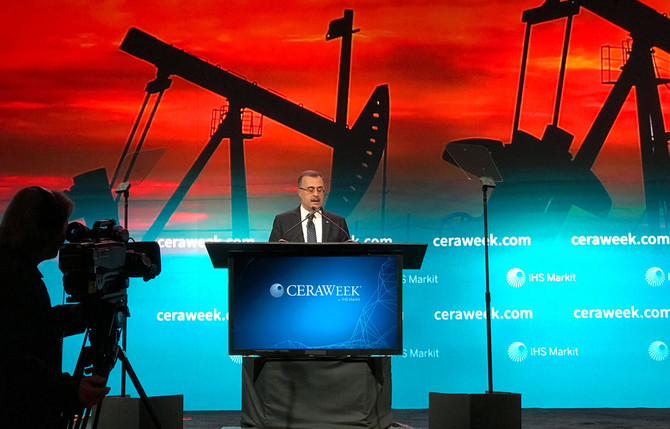
Global collaborations crucial to address global challenges, says Saudi official
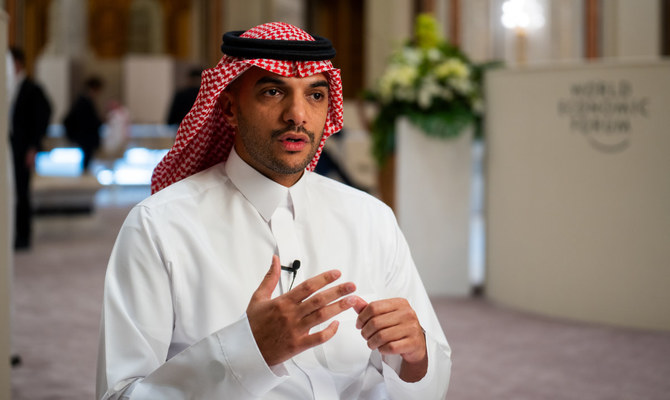
- Ammar Nagadi, vice minister of economy and planning, talks to Arab News on the sidelines of World Economic Forum Special Meeting in Riyadh
RIYADH: Global collaborations are a crucial element in efforts to tackle economic and social challenges, especially given the current state of the world, a leading Saudi official said.
In an interview with Arab News on the sidelines of the two-day World Economic Forum Special Meeting on Global Collaboration, Growth and Energy for Development, which concluded on Monday in Riyadh, the Kingdom’s vice minister of economy and planning, Ammar Nagadi, spoke about the important role such gatherings can play in advancing economic cooperation to address global challenges.
He believes the world is going through a “unique” time, with economic and social challenges worldwide and human development at a critical stage.
“Because of this, global collaboration and the world convening together becomes more and more important,” Nagadi said.
“We have seen that over the last few years Saudi Arabia is becoming a platform that brings together different people from different parts of the world to discuss challenges and to address these challenges” and the World Economic Forum special meeting is a continuation of that process, he added.
“We have more than 1,000 leaders today from different sectors (attending the meeting). We have heads of states, private sector and public sector leaders, and entrepreneurs from more than 70 countries across the globe.
“I think this diverse group, coming together to discuss and address global challenges is a unique opportunity and we are very happy to have it here in Riyadh today.”
Describing the economic landscape in the Kingdom, Nagadi said the Saudi economy is going through a very strong period of transformation that is reflected in the progress the country has made in terms of growth and diversification.
“Last year, Saudi Arabia’s non-oil activities grew by 4.4 per cent but I think the most important thing to realize is that non-oil activities, as a percentage of total gross domestic product, have reached, for the first time in history, 50 percent of the total GDP,” he added.
This represents a significant milestone that reaffirms the progress made in efforts to diversify the national economy, he added, which have created numerous benefits, including investment opportunities and improved job prospects for Saudis.
“If I take one example, you will see that unemployment last year in the last quarter has reached an all-time low of 7.7 per cent and we hope to see that momentum continuing,” Nagadi said.
He believes this momentum will also continue in terms of growth and diversification.
“We target to grow around 5 per cent for non-oil activities this year but we have seen recent forecasts by the IMF (International Monetary Fund) where they’re expecting Saudi Arabia to further grow in 2025 by around 6 per cent,” he added.
Saudi Arabia is also making progress toward achieving sustainability goals, which Nagadi said is another important topic.
“What we have today is Vision 2030, which is very ambitious, and sustainability is an integral part of that vision,” he added.
“We have economic goals, social goals, environmental goals. If I were just to take the environmental part of the sustainable development goals, you will see that Saudi has put in a lot of efforts as part of Vision 2030.”
The Saudi Green Initiative, announced in March 2021, is a great example of what the Kingdom is doing not only to drive economic growth but also protect the planet, Nagadi said.
“The aim is to achieve net-zero emissions by 2060, and the goals are to increase the renewable energy mix to 50 percent of the total energy mix and plant 10 billion trees by 2030 as well as protecting land and sea,” he said, adding that 50 million trees have already been planted.
Saudi-UK economic symphony hits high note with Vision 2030, Lord Mayor of City of London tells Arab News
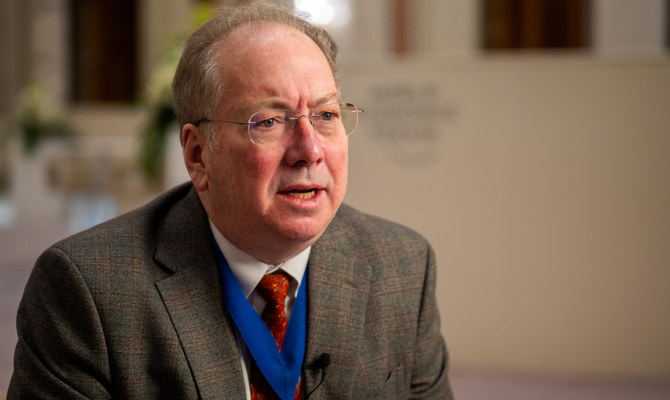
- Michael Mainelli: ‘With the amazing changes under Vision 2030, we’re anticipating yet more investment both ways’
RIYADH: Business and investment between Saudi Arabia and the UK are flourishing under the “amazing” Vision 2030 reform plan, with expectations for further collaborations on the horizon, the Lord Mayor of the City of London told Arab News in Riyadh.
Michael Mainelli said of the business and investment connections between Saudi Arabia and the City of London: “The Gulf is our fourth-largest trading partner with about £65 billion ($81.47 billion) in trade every year, and Saudi is the largest chunk of that to well over £17 billion, so trade is very good.”
Saudi investment in the City of London has always been “very, very strong, and British investment in Saudi has also been strong. I don’t think there’s anything other than growth, and with the amazing changes under Vision 2030, we’re anticipating yet more investment both ways,” he added.
“The great thing about Vision 2030 is that it’s almost like a pyramid, with the entire nation working together towards a whole series of goals.”
The UK is “the world’s premier professional financial services sector, so there will always be opportunities for us to collaborate with Saudi Arabia” in this field, Mainelli said. “I think less appreciated is our recognition of Saudi intellect.”
He said he is “trying to make connections” in Riyadh, adding that Saudi academia, science, technology and research “are growing very well.”
Mainelli outlined three main avenues of Saudi investment in the City of London: property development, operational businesses, and science and technology. He added that Saudis are also investing in areas such as media distribution and packaging.
“I’m looking forward to a tremendous amount of Saudi investment in science and technology, particularly in areas like hydrogen, where Saudi Arabia is very strong, as well as in desalination and biotech,” he said.
Emphasizing initiatives aimed at bolstering economic cooperation between Saudi Arabia and the UK, he said: “The British government is hosting a two-day conference here in Riyadh from May 14 to 15. We’re bringing over about 400 to 500 British firms to look at areas where they’re looking at technology.
“Equally, in June we have our Net Zero Delivery Summit, where Saudi Arabia will be present, and on June 24 the UK-Saudi infrastructure meeting, where we’ll discuss infrastructure projects both ways.”
Providing insight on how the UK can further strengthen economic relations with Saudi Arabia, especially after having left the EU, Mainelli said: “The Brexit vote was over eight years ago, and in the City of London we’ve grown from 525,000 workers to 615,000 workers — a net gain of 90,000.
“Also, assets under management globally have increased from just over 12 percent to about 15 percent of global assets. So the City of London has been doing very well post-Brexit.”
Mainelli highlighted the value of conferences such as the World Economic Forum in Riyadh, which he attended, as catalysts for business deals, often beginning with conversations between individuals.
“It’s great to have this event. It focuses very much on cooperation, particularly in the energy sphere, which is fundamental to economic growth,” he said.
“Britain is a petrostate in its own right, not as strong as Saudi Arabia. Both countries have to work on what’s their energy transition going to be in a net zero world.”
Besides geopolitical tensions, trade restrictions pose significant barriers to global collaboration, Mainelli said.
“These are present in both goods and services, particularly in professional services, and the way to address them … is through standards. These are ISO (International Organization for Standardization) standards, which I’m promoting for artificial intelligence and space sustainability, for example,” he added.
“These are mutual recognition standards for professionals working, so a Saudi accountant could work in Britain and vice versa, and similarly for lawyers etc.
“The third area concerns governance standards and how organizations are managed. So I believe probably the biggest thing to constantly work at is standards.”
Mainelli stressed the need to address geopolitical tensions, “but as a business community we’re not deeply involved in those negotiations, decisions or military actions, so it’s important for us to understand how we should be reacting to and how we can support peace through trade.”
Global ‘Center for Space Futures’ announced at World Economic Forum
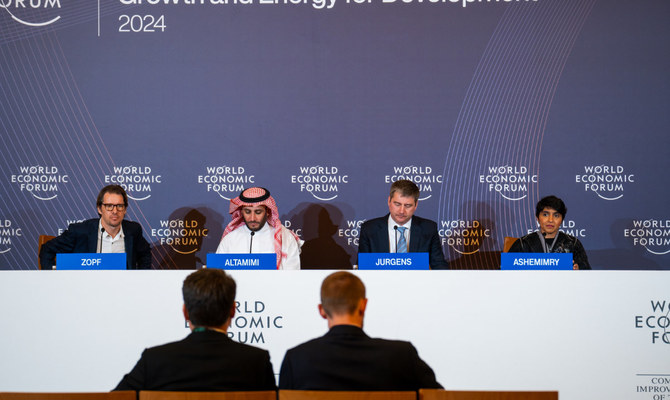
- The center aims to facilitate public-private discussions on space collaboration, incorporating best practices from the WEF and its communities into the global space sector
RIYADH: The World Economic Forum and the Saudi Space Agency signed an agreement to establish the Center for Space Futures, a Centre for the Fourth Industrial Revolution.
Hosted by the SSA, the center is expected to open later this year and will be the first in the C4IR network to focus exclusively on space. It will operate alongside the existing national center, C4IR Saudi Arabia, to advance Saudi Vision 2030.
Jeremy Jurgens, the WEF managing director, told Arab News: “Historically, many people assume that space is the exclusive domain of a few countries that have a fully integrated space technology stack. What we’ve seen over the last few years is that space is something that should be available to the whole globe.
“By launching the Center for Space Futures here in Saudi Arabia, we’re actually demonstrating that space is something for all humanity, and that we can actually unlock those benefits and use them anywhere and everywhere.”
The center aims to facilitate public-private discussions on space collaboration, incorporating best practices from the WEF and its communities into the global space sector, and generating contributions to accelerate space technologies.
Dr. Mohammed Al-Tamimi, CEO of the SSA, told Arab News: “This center is part of a global platform that will engage everyone to make sure that we’ll be activating public and private discussions, especially in this era.” As the world experiences a shift from a government-centered space sector to a private-centric sector, Al-Tamimi said that the center offers “great potential to collaborate and engage more with the private sector and government initiatives.”
The officials said they are committed to harnessing the vast opportunities of the space industry and creating a sustainable economy globally through best practices, governance, policies, innovation and valuable technologies to encourage further cross-sector engagement.
Mishaal Ashemimry, managing director of the Center for Space Futures, told Arab News: “Space generally has seen no boundaries when it comes to development, and you need the input of international countries with their expertise, their backgrounds, their achievements in space, to work together, whether it’s towards a mission or achieving governance policies … Space cannot move forward without international collaboration.”
The center will join 19 others that make up the C4IR network, a platform for multistakeholder collaboration, bringing together public and private sectors to maximize technological benefits to society while minimizing the risks.
The WEF launched the first C4IR in San Francisco in 2017, followed soon after by others in Japan and India. The network now includes the Centre for Trustworthy Technology, in Austin, the US Centre for Advanced Manufacturing, in Detroit, Germany’s Global Government Technology Centre, Norway’s HUB Ocean, and others in Rwanda, Saudi Arabia, Serbia, South Africa, India, Turkiye and the UAE.
Saudi Arabia likely to meet tourism targets ahead of 2030, says top official

RIYADH: Based on Saudi Arabia’s extraordinary achievements in the tourism sector, the Kingdom is likely to achieve its targets ahead of 2030, said a top tourism official.
During a panel at the Future Hospitality Summit held in Riyadh, Gloria Manzo, chief special adviser at the Ministry of Tourism, likened Saudi Arabia’s approach toward the development of the sector to the private sector with clear goals with key performance indicators reviewed quarterly.
She added: “We have goals, we have quarterly meetings that review our KPIs quarterly. You better be on the plan and if not, you have to explain why, so most likely it will achieve those numbers, before 2030. Absolutely!.”
Manzo noted that increasing the target indicates that Saudi Arabia is progressing faster than expected, which reflects a positive momentum in achieving tourism goals.
She said for Saudi Arabia “the sky is the limit.” The development process in the Kingdom, she added, is supported by unprecedented levels of government investment.
“What the government is doing in this country, there’s no other example in the world. I have never seen something like this in my 30 years of career,” the official said.
She also highlighted challenges facing the tourism sector such as geopolitical issues and weather-related crises, which can disrupt operations.
The official identified the development of human resources for the sector as a challenge for which the government is taking several measures.
“We wish we could do that faster. The ministry is training Saudis abroad. We announced a (training) academy. We’re partnering with universities here. That is very important, but it will be wonderful if we can train them faster. The private sector is also helping us to train these Saudis,” she said.
Manzo also expressed optimism about more Saudi women joining the tourism industry.
The official said interestingly the Saudi government “moves faster than the private sector” unlike any other country in the world where the latter tends to act quicker. She said small and medium enterprises require more support to keep pace with the ongoing development in the sector.
“I would say the SMEs need more support, and of course, we wish we can support them so that they can accelerate in this transition,” Manzo added.
“We’re working with them. We have a plan and the ecosystem is very structured,” the tourism official said.
Saudi chemicals giant SABIC targeting net zero by 2050, CEO says
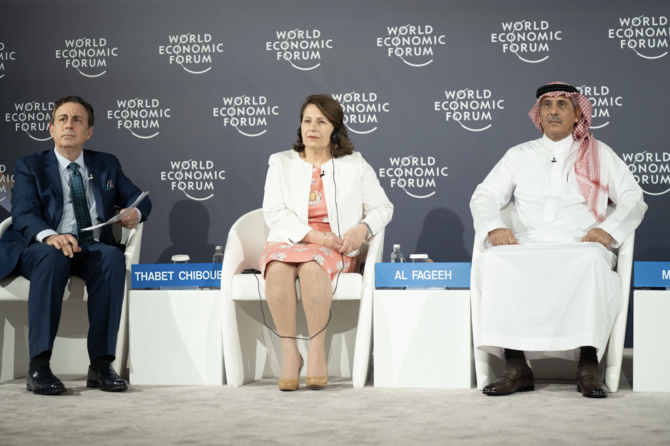
- SABIC aims to convert 1 million tons of waste into feedstock for the petrochemical industry by 2030, Al-Fageeh said
RIYADH: Saudi Arabia’s top chemicals company is turning to circular economy solutions to reach carbon neutrality by 2050 and advance the Kingdom’s net-zero agenda, its CEO has said.
Abdulrahman Al-Fageeh, CEO of the Saudi Basic Industries Corporation, was speaking at the “Demand for Energy ... Transforming Costs into Gains” panel during the special meeting of the World Economic Forum in Riyadh.
SABIC aims to convert 1 million tons of waste into feedstock for the petrochemical industry by 2030, he said.
The circular carbon economy has helped the chemicals sector expand its investment horizon since 2020, he added.
Al-Fageeh said that SABIC marked achievements in energy efficiency and reduced its carbon footprint at the end of 2023 by 12.74 percent. The company is targeting carbon neutrality by 2050.
SABIC has also adopted alternative energy from plastic waste, seeking to produce 1 million tons of sustainably sourced chemicals by 2030.
Energy efficiency
Al-Fageeh said that his company had started sustainability programs at an early stage, improved reliability, developed 90 initiatives and projects, and closed a number of sites due to ineffectiveness.
In 2023, SABIC had more than 200 patents, 40 percent of which related to sustainability in energy efficiency.


